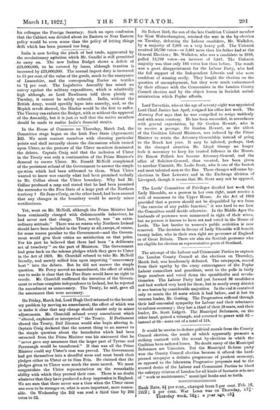Yet, went on Mr. McNeill, although the Prime Minister had
been continually charged with dishonourable behaviour, he bad never met that charge. That, surely, was "an extra- ordinary attitude." There was no reason why Northern Ireland should have been included in the Treaty at all, except, of course, for some reason peculiar to the Government—and the Govern- ment would give their critics no satisfaction on that point. For his part he believed that there had been "a deliberate act of treachery" on the part of Ministers. The Government had gone back on the solemn pledges which they gave to Ulster in the Act of 1920. Mr. Churchill refused to take Mr. McNeill literally, and merely rallied him upon importing "unnecessary heat" into the debate. But he did not answer the simple question. Mr. Percy moved an amendment, the effect of which was to make it clear that the Free State would have no right to secede. Mr. Churchill reaffirmed the intention of the Govern- ment to refuse complete independence to Ireland, but he rejected the amendment as unnecessary. The Treaty, he said, gave all the assurances that were necessary.


































 Previous page
Previous page